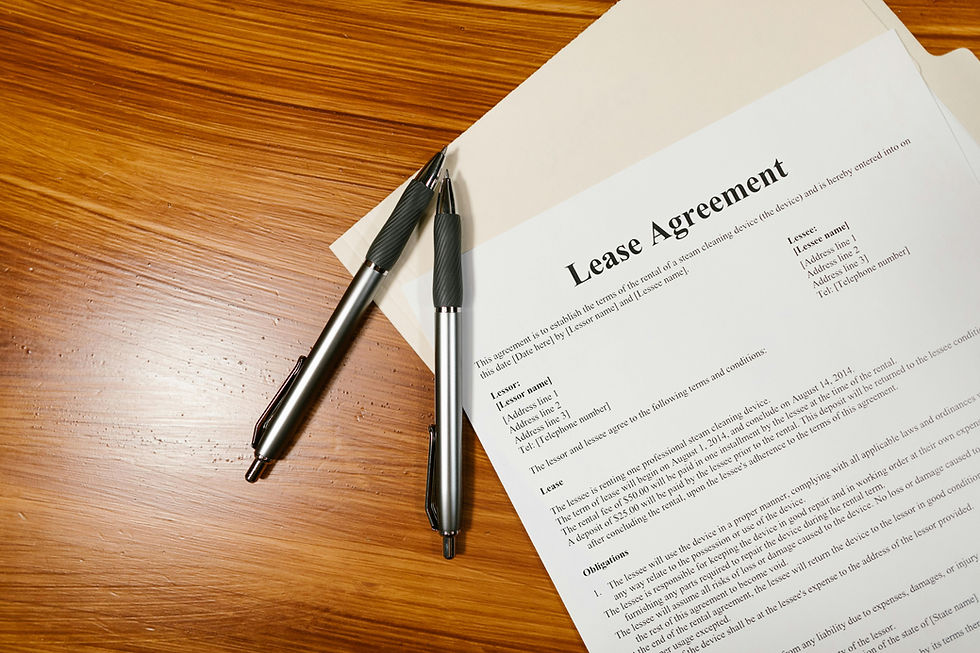A Landlord’s Perspective: Top 10 Roles of a Property Manager
- eweinblatt3
- May 2, 2025
- 3 min read
As a commercial real estate consultant, I’ve worked with countless landlords who’ve struggled with property management challenges—from tenant disputes to unexpected maintenance costs. A great property manager doesn’t just collect rent; they protect your investment, maximize returns, and minimize headaches.

Here are the 10 most critical roles of an effective property manager from a landlord’s perspective:
1. Tenant Screening & Leasing
A property manager’s first job is finding quality tenants who:✔ Pay rent on time✔ Respect the property✔ Stay long-term
They handle:
Background & credit checks
Lease negotiations
Move-in/move-out inspections Example: One client avoided a $50,000 eviction by catching a tenant’s falsified financials during screening.
2. Rent Collection & Financial Management
A professional manager ensures:
✅ On-time payments (with late fee enforcement)
✅ Digital payment systems for convenience
✅ Detailed financial reporting (monthly/quarterly)
Pro Tip: Look for managers who offer automated rent collection—it reduces delays by 80%.
3. Maintenance & Repairs
The best managers:
✔ Prevent small issues from becoming costly (e.g., leaky roofs, HVAC failures)
✔ Have vetted contractors (plumbers, electricians, etc.) at discounted rates
✔ Handle emergency repairs 24/7
Red Flag: If a manager doesn’t conduct regular property inspections, maintenance costs will spike.
4. Lease Enforcement & Compliance
A strong manager:
Enforces lease terms (no unauthorized sublets, pets, or alterations)
Stays updated on local landlord-tenant laws
Handles lease renewals & rent increases strategically
Did You Know? In some cities, failing to return a security deposit on time can result in 3x penalties.
5. Property Marketing & Vacancy Reduction
Top managers minimize vacancies by:
✔ Professional listings (photos, virtual tours, SEO-optimized ads)
✔ Competitive pricing analysis
✔ Quick tenant turnover (cleaning, repairs, remarketing)
Stat: Well-marketed properties lease 30-50% faster than DIY listings.
6. Financial Optimization (Maximizing ROI)
Beyond rent collection, great managers:
Identify value-add opportunities (e.g., amenity upgrades)
Recommend rent adjustments based on market trends
Reduce operating expenses through bulk vendor discounts.
Case Study: A client increased NOI by 12% after their manager renegotiated vendor contracts.
7. Handling Tenant Issues & Disputes
From noise complaints to maintenance requests, managers:
✔ Resolve conflicts before they escalate
✔ Document all communications (critical for legal protection)
✔ Maintain positive tenant relations (reduces turnover)
Key Skill: The best managers are firm but fair—tenants respect consistency.
8. Legal & Regulatory Compliance
Property laws change frequently. Managers must:
Ensure ADA/FHA compliance
Handle evictions properly (one misstep can cost thousands)
Stay updated on rent control ordinances (if applicable)
Warning: In some states, wrongfully withholding a deposit can lead to $10K+ fines.
9. Insurance & Risk Management
A proactive manager:
✔ Reviews insurance policies annually (coverage gaps can be disastrous)
✔ Mitigates liability risks (e.g., slip-and-fall hazards)
✔ Documents all incidents (for insurance claims)
Must-Have: Ensure your manager carries errors & omissions (E&O) insurance.
10. Long-Term Asset Strategy
The best managers think beyond day-to-day operations:
✅ 5-year capital improvement plans
✅ Market repositioning strategies (e.g., Class B to Class A)
✅ Exit strategy advice (when to sell, refinance, or 1031 exchange)
Expert Insight: Buildings with professional management sell for 15-20% more.
Does Your Property Manager Cover All 10 Roles?
If not, you could be leaving thousands in profit on the table—or worse, risking costly legal issues.
As a commercial real estate advisor, I help landlords:
✔ Evaluate property management companies
✔ Optimize lease terms & tenant quality
✔ Implement systems that boost NOI
📅 Book a Free 30-Minute Consultation


